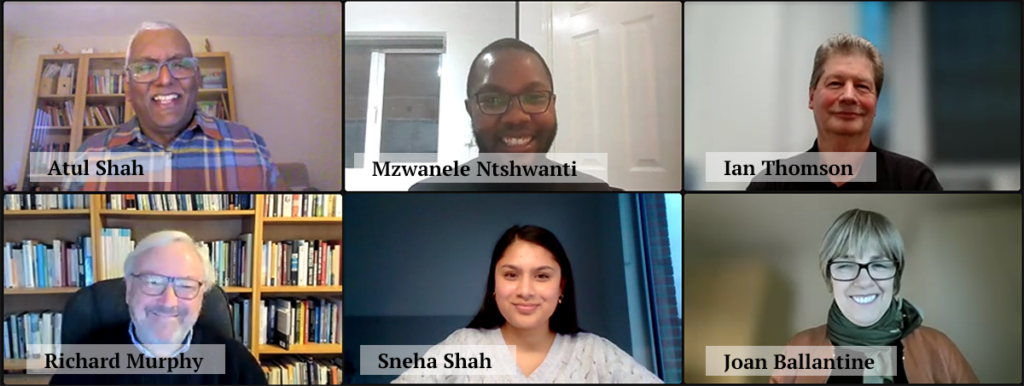Abolish or reform accountancy degrees?
This event was organised by Rethinking Accountancy, part of the Rethinking Economics network. This was their first live seminar in February 2023.
Professor Joan Ballantine, University of Ulster
Joan Ballantine outlined a historical context of accounting degrees, explaining that as their number has expanded, they’ve been shaped by increased competition within higher education and a growing emphasis on vocational skills.
Significantly, most degree programmes are subject to the professional bodies’ accreditation process, which requires them to meet their technical standards. Consequently, universities have put themselves in a difficult position of relying on accreditation status to attract students to their courses.
These historical factors have narrowed the accounting curriculum, focusing on standards and technical issues, implying that accounting is an objective field of study rather than a social science.
She suggests that accounting academics have a significant role in shaping an accounting curriculum relevant in an uncertain world. There is an opportunity to develop degree programmes that consider emerging areas of accounting, for example, ethics, social impact and sustainability. She also calls for a change in how accounting is taught by adopting dialogical teaching approaches, collaborative processes of learning and discovery and an appreciation of diverse perspectives. After all, future professional accountants will require critical thinking, analytical and problem-solving skills.
Professor Ian Thomson, University of Birmingham
Ian Thomson went further, demanding a shift from accounting to accountability-based degrees, which “is the purpose of accounting”. He acknowledged that the world needs accounting because it makes taxation possible and enables us, for example, to criticise the excessive profits of oil companies extracted at irreparable environmental harm.
But the world would be better with better accounting. Rather than hold businesses to account by the profits they generate (“a weird measure”), why not measure them based on the benefits and harms they create for other systems? An accountability-based degree requires understanding systems in a broader context than corporations. He calls for an accounting of communities, nations and of ecosystems.
Professor Richard Murphy, Sheffield University
Richard Murphy agreed that we need accounting degrees, “but not the ones we’ve got”. He worries that much of what we teach our students is irrelevant. “We talk about the numbers, but we do not teach students to think”. He believes that accounting regulators and professional bodies are responsible for a neoliberal framing of accounting objectives.
For example, why is there no accounting standard for employment and employees? Why do we privilege shareholders over other capital providers and stakeholders? The profession should be working to hold corporations to account, but rather, it is seeking to deny its responsibility for sustainability accounting. He cites a Big Four firm that warned clients not to make certain disclosures in their narrative reports in case it led to a “provisioning event”, i.e., a narrative disclosure may result in recognising a financial obligation on the balance sheet.
He encourages academics to be brave enough to write their own standards and tell the profession that they’re not up to it. And students could be interactive in that process.
Sneha Shah, Warwick University undergraduate
Sneha Shah is a third-year student and describes herself as of Indian heritage, raised in Kenya and living in the UK. Her perspective on accounting education is that it is portrayed as specific and objective rather than social and negotiated. The standard description of accounting as collecting, recording and reporting information is inadequate.
More generally, she believes the current curriculum fails to reflect that around 81% of businesses worldwide are owned and operated by families. These entities have a completely different culture and context to the corporate reporting considered by accounting degrees. They are often deeply rooted within a religious context and closely embedded within their communities. Business owners have closer relationships with their customers, suppliers and employees. The ethical and cultural dimensions inherent in these communities could be explored in accounting degrees.
Mzwanele Ntshwanti from the University of South Africa and event organiser is keen that academics engage more forcefully with students and professional bodies. He acknowledges that it is challenging for academics working in departments that are not having these discussions. Still, he promised Rethinking Accountancy would be a place for discussion and resources. There are plans to provide teaching materials, textbooks, student surveys, local events and research programmes.

Rethinking Accountancy is a group of students, academics, professionals and community-based individuals campaigning to transform accountancy education and the profession. They believe the current systems are narrow, culturally uniform and insufficiently responsive to the ethical challenges faced by the profession. This perpetuates social, economic, and environmental injustices.
They are calling for changes in accountancy and finance education to create critical professionals equipped to address the challenges of inequality and injustice and to foster a sustainable future.
If you’d like to contribute to the group or learn more, please get in touch with Mzwanele Ntshwanti.
Resources and further reading
Sikka et al., (2007), Professionalizing claims and the state of the UK’s professional accounting education: some evidence. Accounting Education: an international journal, 16(1): 3–21. https://doi.org/10.1080/09639280601150921
Parker, L (2007), Professionalisation and UK Accounting Education: Academic and Professional Complicity – A Commentary on ‘Professionalizing Claims and the State of UK Professional Accounting Education: Some Evidence, Accounting Education: an international journal, 16(1): 43-3. https://doi.org/10.1080/09639280601151044
ICAEW, Time for chartered accountants to change the world.
https://www.icaew.com/insights/insights-specials/when-chartered-accountants-save-the-world
© AccountingCafe.org




Im very keen to attend but timing does not suit. can I get a recordin? Im President of the Malaysian Accounting Association which is a platform for accounting educators. This conversation interests us tremendously.
Dear Susela,
It is wonderful to hear that this would interest you greatly. My name is Mzwanele Ntshwanti and I am the Rethinking Accountancy organizer. We will definitely record the webinar and post the link on our socials.